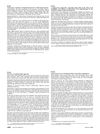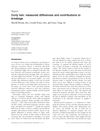 December 2023 in “Frontiers in oncology”
December 2023 in “Frontiers in oncology” Older ovarian cancer patients live longer and tolerate weekly chemotherapy better than three-weekly treatments.
 December 2022 in “Indian Journal of Animal Research”
December 2022 in “Indian Journal of Animal Research” Both fluoxetine and clomipramine effectively treat dog lick dermatitis, but fluoxetine works faster with lower recurrence, while clomipramine has fewer side effects.
 4 citations,
July 2019 in “Children (Basel)”
4 citations,
July 2019 in “Children (Basel)” The review concludes that more research is needed to better improve the health outcomes for people with Polycystic Ovarian Syndrome.
 2 citations,
September 2023 in “Scientific reports”
2 citations,
September 2023 in “Scientific reports” The nanocomposite films with vitamins and nanoparticles are promising for fast and effective burn wound healing.
 2 citations,
January 2008 in “Journal of The American Academy of Dermatology”
2 citations,
January 2008 in “Journal of The American Academy of Dermatology” Trichoscopy is a helpful and quick method to diagnose hair loss without shaving.
 January 2024 in “Biological trace element research”
January 2024 in “Biological trace element research” Isotretinoin affects trace element levels and requires monitoring of liver and kidney functions.
 June 2011 in “Oncology times”
June 2011 in “Oncology times” New treatments are making advanced prostate cancer management more complex but also more hopeful.
 97 citations,
September 2006 in “Pharmaceutical Research”
97 citations,
September 2006 in “Pharmaceutical Research” No treatment fully prevents hair loss from chemotherapy yet.
 78 citations,
September 2006 in “International Journal of Cosmetic Science”
78 citations,
September 2006 in “International Journal of Cosmetic Science” Dandruff is mainly caused by a scalp reaction to yeast, can worsen hair loss, and antifungal treatments may help.
52 citations,
June 2009 in “Clinical Toxicology” Polonium poisoning is diagnosed by detecting it in urine and feces, and treated with supportive care, infection prevention, and chelation therapy.
 36 citations,
August 2011 in “Journal of dermatological science”
36 citations,
August 2011 in “Journal of dermatological science” Human hair has a protective lipid layer that can be damaged by moisture and treatments, affecting hair growth and health.
 13 citations,
November 2012 in “International Journal of Dermatology”
13 citations,
November 2012 in “International Journal of Dermatology” Curly hair breaks more easily, especially with chemical treatments, but simpler grooming reduces breakage.
 10 citations,
January 2016 in “Dermatology online journal”
10 citations,
January 2016 in “Dermatology online journal” Adults with persistent scalp issues unresponsive to typical treatments should be tested for the fungal infection tinea capitis to start the right antifungal medication.
 8 citations,
August 2019 in “Dermatologic surgery”
8 citations,
August 2019 in “Dermatologic surgery” Nonsteroid treatments for alopecia areata show promise but need more high-quality research.
 5 citations,
November 2011 in “Expert Review of Dermatology”
5 citations,
November 2011 in “Expert Review of Dermatology” The document concludes that early diagnosis and a comprehensive treatment plan are crucial for managing hair loss in children, with a focus on both medical and psychological support.
 3 citations,
January 2021 in “Wear”
3 citations,
January 2021 in “Wear” Hair's resistance to wear varies by ethnicity and treatment, with less wear indicating stronger hair.
3 citations,
May 2011 in “Facial plastic surgery clinics of North America” Laser treatments can effectively reduce fine wrinkles and improve skin texture.
 1 citations,
January 2023 in “Cutis”
1 citations,
January 2023 in “Cutis” You might not need to stop cancer treatment if you get a rare skin reaction from EGFR inhibitors, as skin treatments can help manage it.
 January 2024 in “International journal of homoeopathic sciences”
January 2024 in “International journal of homoeopathic sciences” Homeopathic treatments can effectively manage hair loss and improve well-being.
 August 2023 in “Tzu Chi Medical Journal”
August 2023 in “Tzu Chi Medical Journal” Iron deficiency is the main cause of hair loss in women, and iron supplements started within 6 months can improve hair health.
 June 2018 in “Acta Scientiae Veterinariae”
June 2018 in “Acta Scientiae Veterinariae” Tailored treatment plans are crucial for managing canine dermatomyositis-like disease.
 February 2013 in “Archives of Disease in Childhood: Education & Practice”
February 2013 in “Archives of Disease in Childhood: Education & Practice” Different types of alopecia in children require specific diagnoses and treatments.
 January 1998 in “Lasers in Surgery and Medicine”
January 1998 in “Lasers in Surgery and Medicine” Lasers are effective and safe for various medical treatments, including cancer, wound healing, and skin conditions.
March 2021 in “Berkala Ilmu Kesehatan Kulit dan Kelamin” The best treatment for male pattern baldness is a combination of topical minoxidil and oral finasteride.
514 citations,
February 2011 in “International journal of women's health” Different treatments for PCOS focus on the specific symptoms, with weight loss and lifestyle changes being important.
 405 citations,
May 2007 in “Journal of The American Academy of Dermatology”
405 citations,
May 2007 in “Journal of The American Academy of Dermatology” Obesity affects skin health, causing conditions like acanthosis nigricans and may require different treatment approaches.
133 citations,
July 2020 in “Cells” Creating fully functional artificial skin for chronic wounds is still very challenging.
 109 citations,
September 2011 in “Human molecular genetics online/Human molecular genetics”
109 citations,
September 2011 in “Human molecular genetics online/Human molecular genetics” New treatments targeting specific genes show promise for treating keratin disorders.
 66 citations,
June 2018 in “International Journal of Women's Dermatology”
66 citations,
June 2018 in “International Journal of Women's Dermatology” No cure for female pattern hair loss, but various effective treatments exist.
60 citations,
August 2022 in “ESMO Open” Trastuzumab deruxtecan is effective for HER2-positive breast cancer but requires careful management of side effects.























